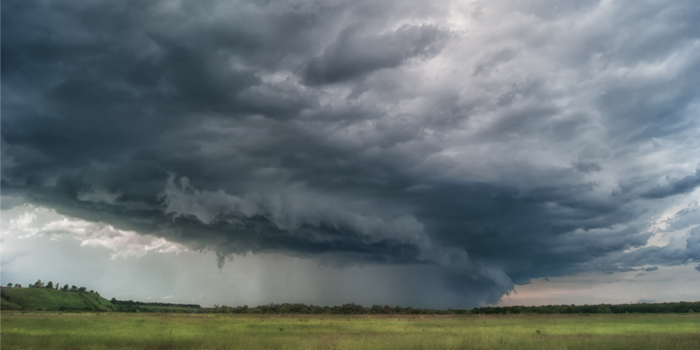
Background information
Move, warm up, stimulate circulation: five tips to get rid of cold hands and feet
by Olivia Leimpeters-Leth

The low-pressure area makes an entrance disguised as a stabbing headache and then departs again, leaving you with a staggering tiredness. Anyone who suffers from weather sensitivity is familiar with these problems. But do you also know the solutions?
Plummeting temperatures, low pressure, thunderstorms, foehn winds – strong fluctuations in temperature and air pressure put a strain on the body and circulation. People who react particularly sensitively to these changes are called weather-sensitive.
Joint pain or migraines before the weather changes are completely normal for weather-sensitive people. For outsiders, symptoms initially sound pseudo-psychic or like pure imagination. But according to the German Weather Service (document in German), every second person in Germany claims to be regularly affected by sensitivity to the weather. However, there’s little scientific evidence of how the weather and the body interact.
Subjectively, the weather sensitivity sets in hours before the drop in temperature. Those affected complain of headaches and even migraines, tiredness, fatigue, joint pain and poor sleep.
The idea that weather affects your body isn’t far-fetched. Various physical processes take place in the atmosphere and influence not only the weather, but also the human organism. This «biotropy of the weather» – i.e. the effect of the weather on the human body – is particularly evident in the case of a receding high pressure area and an approaching low pressure area, in the case of warm and cold fronts and in the case of a receding low pressure area. This is because meteorological elements such as temperature, humidity, air movement, cloud cover, light conditions and air pressure change particularly strongly here. You feel these changes most when they happen quickly and suddenly,
as they strain your body’s ability to adapt. More precisely, your autonomic nervous system, which controls all regulatory mechanisms. Take extreme temperatures: if the ambient temperature suddenly rises from 25 to 35 degrees Celsius, your body struggles to maintain a comfortable body temperature of 37 degrees Celsius, and symptoms of weather sensitivity arise.
First of all, weather sensitivity isn’t an illness. In medical meteorology, a distinction is made between people who react to the weather, people who are sensitive to the weather and people with underlying medical problems who are at more risk in weather changes.
Healthy people are generally less affected because weather sensitivity decreases and increases with vegetative adaptability. The likelihood of reacting sensitively to changes in the weather increases with age, chronic stress or pre-existing conditions. This is shown, among other things, by a survey on weather sensitivity by the German Federal Environment Agency. It states that 76 per cent of people who describe themselves as sensitive to the weather suffer from chronic pre-existing conditions, such as respiratory diseases or chronic pain.
However, there is little scientific evidence of weather sensitivity. Little has been proven, for example the «thermal effect complex», which states that temperature and humidity have an effect on your well-being and in extreme cases can even lead to rheumatic attacks or heart attacks.
In fact, according to this study, rheumatism attacks occur more frequently during extreme temperatures. In another study, 2,658 people recorded their chronic pain using a mobile phone app over a six-month period. The result: most of the participants noticed greater pain when the weather was damp and windy or the air pressure was particularly low. Based on these results, weather changes can have a significant influence on pain in chronic illnesses.
If you’re healthy, there are easy tips for combatting weather sensitivity. If your body reacts sensitively to the weather, it’s a good idea to expose it to the elements. Exercising your immune system and getting your circulation going is the best way out of weather sensitivity. If you suffer from chronic illnesses, don’t do anything on your own, but talk to your doctor beforehand about these measures and medication.
Alternating showers actually help to strengthen your body against changes in the weather. Alternating between cold and warm water gets the circulation going, supports a fit cardiovascular system and helps to prepare weather-sensitive bodies for a drop in temperature and the like. This alleviates symptoms and makes you independent of weather changes in the long term. A sauna visit can also help to train your body’s ability to adapt to climatic conditions.
In fact, the body learns to adapt to changes in temperature and humidity in well-tempered rooms and reacts more sensitively to them. You can train this adaptability through regular exercise in the fresh air and prevent sensitivity to the weather.
Weather conditions aren’t bad for your body; they train it. Of course, you should make sure you wear good clothing and don’t choose the hottest weather to do sports or to go on a leisurely walk. Be mindful of your body – but don’t be afraid to trust it.
One of the most common victims of weather sensitivity is also a way out of it. Namely, restful sleep. Listen to your internal clock and give your body enough rest and time off. This is important for internal regulation and adaptation processes and helps to calm the autonomic nervous system and thus relieve tension at the end of the day. Healthy sleep reduces the risk of chronic stress.
Header image: Shutterstock
I'm a sucker for flowery turns of phrase and allegorical language. Clever metaphors are my Kryptonite – even if, sometimes, it's better to just get to the point. Everything I write is edited by my cat, which I reckon is more «pet humanisation» than metaphor. When I'm not at my desk, I enjoy going hiking, taking part in fireside jamming sessions, dragging my exhausted body out to do some sport and hitting the occasional party.
Interesting facts about products, behind-the-scenes looks at manufacturers and deep-dives on interesting people.
Show all
Background information
by Olivia Leimpeters-Leth

Background information
by Moritz Weinstock

Background information
by Stefanie Lechthaler